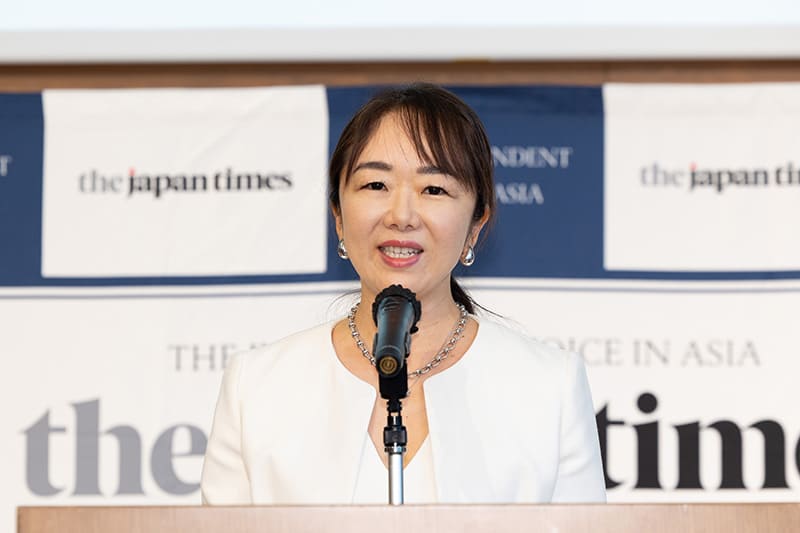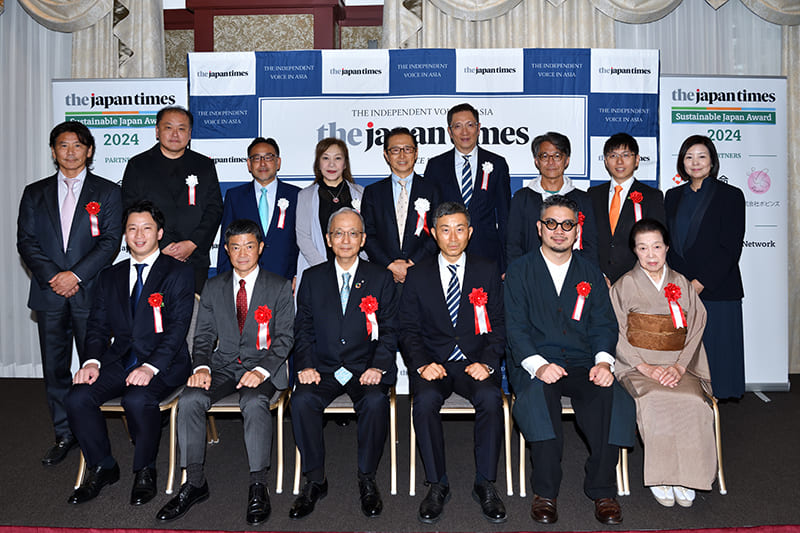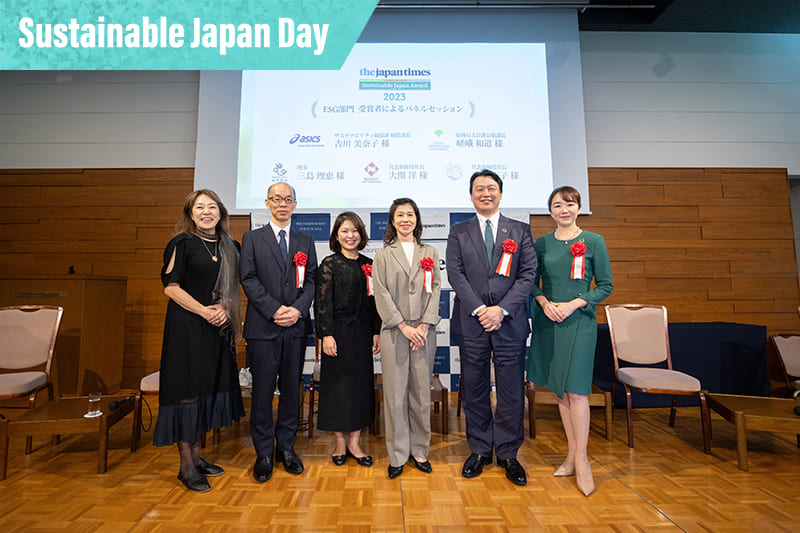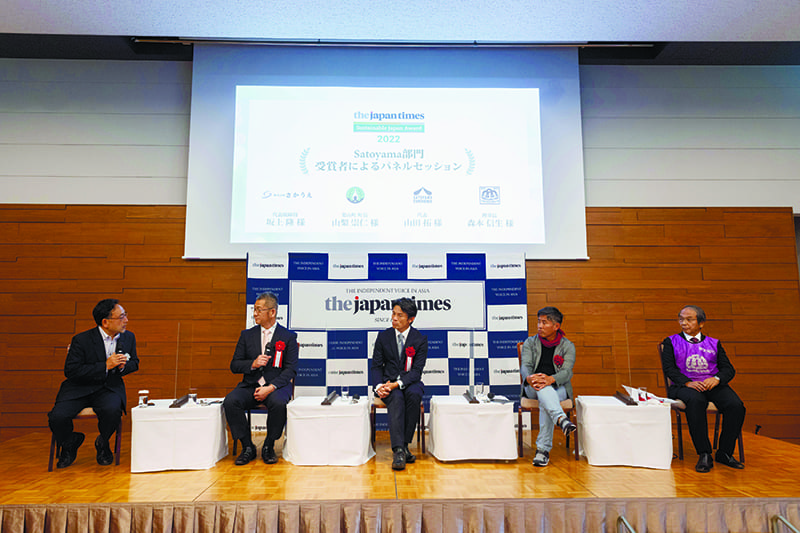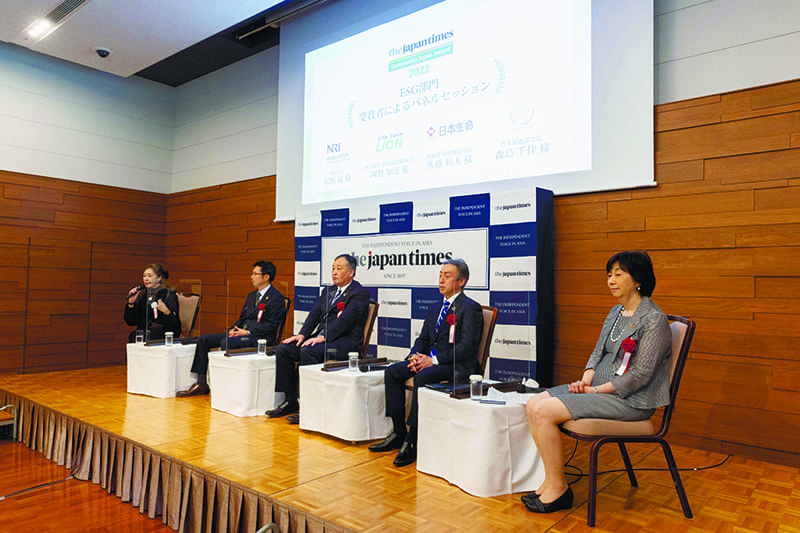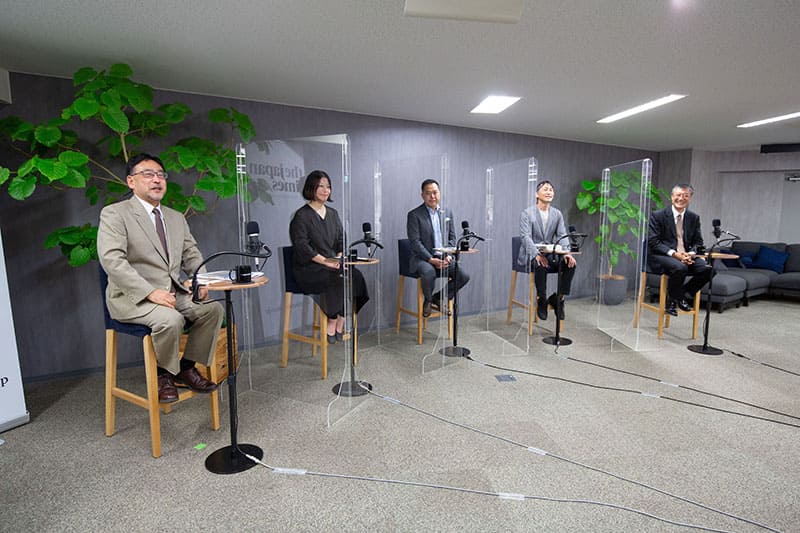October 27, 2025
Sustainable Japan Day 2025
Contributing writer
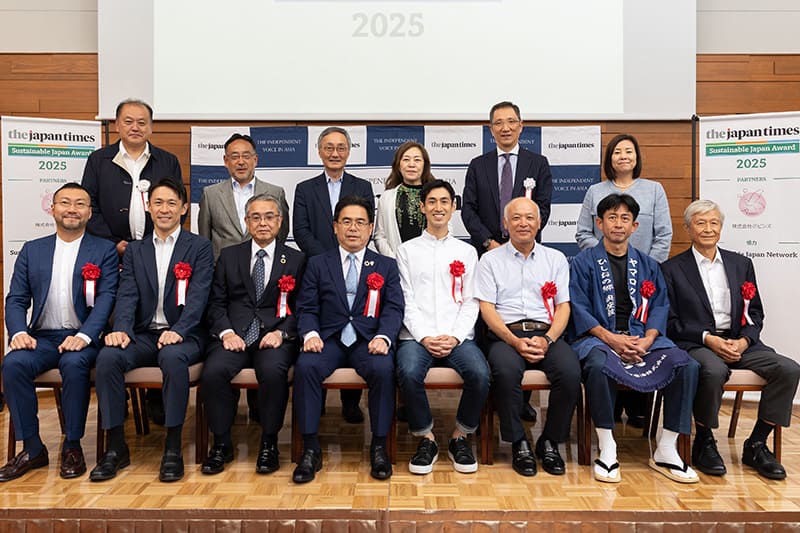
On Sept. 18, The Japan Times held its Sustainable Japan Day at the International House of Japan in Tokyo’s Roppongi area.
The event featured an award ceremony for the winners of the Sustainable Japan Award 2025: one in the ESG category and one in the satoyama category. After the ceremony, two panel sessions were held, one for each category, with representatives of award-winning companies, organizations and local governments introducing the initiatives that led to their winning the awards. In addition, as a special Sustainable Japan Day event, a special dialogue was held.
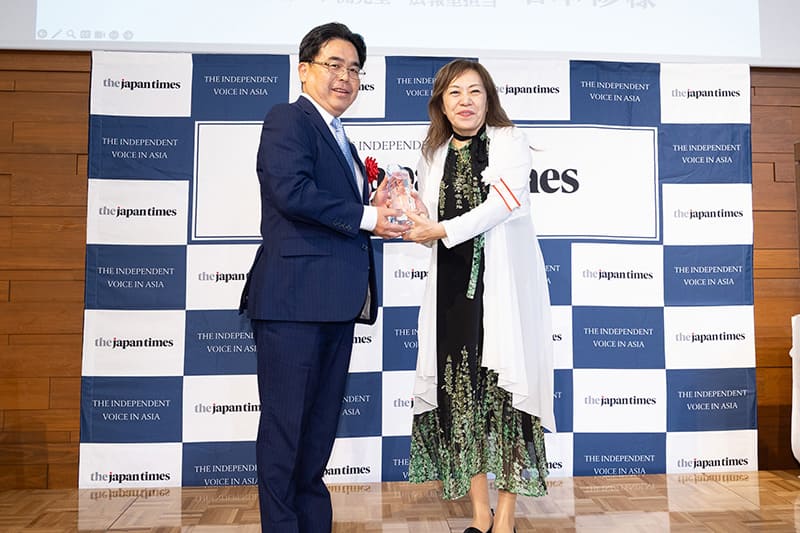
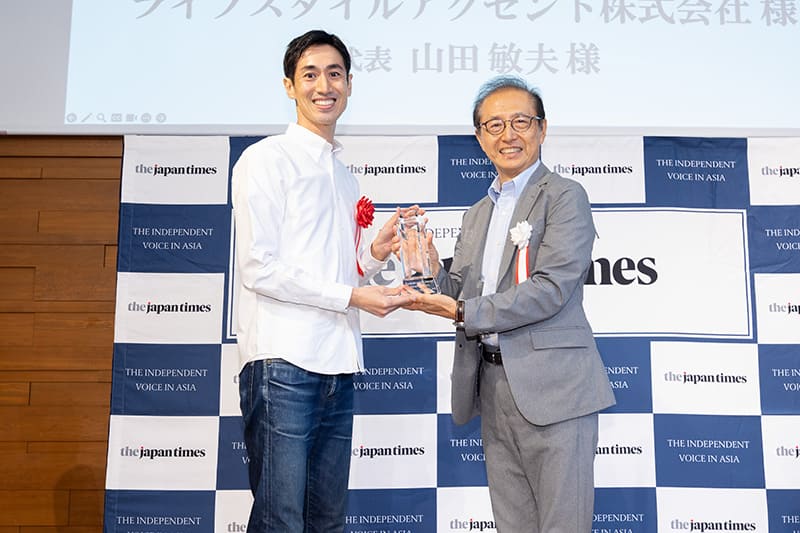
ESG session: Building a sustainable future through collaboration and innovation
The first panel session was moderated by Michiyo Morisawa, the Japan senior lead of Principles for Responsible Investment. Representatives from the award-winning companies took the stage to share their insights on how they can help build a sustainable future, amid accelerating climate change and widening regional disparities.
Hankyu Hanshin Holdings, the Grand Prize winner, promotes sustainable management rooted in the communities it serves through its railway, real estate and entertainment businesses. Yukiko Sagara, general manager of the Corporate Sustainability Department in the Group Planning Division at Hankyu Hanshin Holdings Inc., explained that the group aims to create “towns where people will want to live for generations to come,” engaging in environmental initiatives, next-generation education and the formation of resilient local communities. Together with its group companies, civic organizations and employees, the company carries out around 100 projects annually.
In Osaka’s large-scale Umeda redevelopment project, Grand Green Osaka, Hankyu Hanshin is fostering co-creation among corporations, citizens and startups as a hub that merges greenery and innovation. Collaborative efforts include “Creating Green Spaces Where Butterflies Dance” with Japan Tobacco (JT) and partnerships with the biodiversity app Biome, enabling visitors to experience the richness of nature firsthand. The company is also installing solar panels at railway stations, expanding renewable energy through crowdfunding, and working with 15 local municipalities along its train lines toward a decarbonized society.
Unicharm Corp., recipient of the Excellence Award, is taking on the challenge of horizontal recycling — a world-first initiative to turn used disposable diapers back into new ones. Through its RefF (Recycle for the Future) project launched in 2015, the company has partnered with the municipalities of Shibushi and Osaki in Kagoshima Prefecture to establish a full-cycle system that covers collection, material recovery and remanufacturing. The recycled pulp is now used to produce new diapers, pet sheets and toilet paper.
Senior Executive Officer Tsutomu Kido noted that “such efforts would not be possible without the understanding and cooperation of local residents. Together with Shibushi, a city without an incineration plant, we hope to create a new model for resource circulation.” Beyond reducing waste and carbon dioxide emissions, Unicharm’s initiative also contributes to child care support and job creation, paving the way toward a more sustainable society.
Masahiro Hata of GLIN Impact Capital spoke about the current state and future outlook of impact investing in Japan. He noted that while Japan has long had business traditions that value social contribution, the lack of a shared language to express this as “impact” has slowed its development compared to other countries.
In recent years, however, interest has been growing among government ministries and corporations following the inclusion of the impact concept in the government’s Basic Policy on Economic and Fiscal Management and Reform. Hata described the Government Pension Investment Fund’s decision to explore “impact-integrated investment” as a “game changer,” signaling that capital with a clear social purpose may begin to flow toward businesses tackling societal challenges. He expressed optimism that forthcoming government-led guidelines will further advance Japan’s unique approach to impact investing.
The Special Jury Prize was awarded to the Health and Global Policy Institute (HGPI), an independent, nonprofit, nonpartisan think tank that promotes citizen-led health care policy through collaboration among the public, private, academic and civic sectors. The institute introduced the concept of planetary health, which recognizes the interdependence between the Earth’s environment and human well-being.
With the health care and nursing sectors accounting for roughly 5% of Japan’s total emissions of greenhouse gases, balancing the quality of health care with environmental responsibility has become an urgent challenge. Ryoji Noritake, the chair of HGPI, emphasized that building a sustainable health care system requires reflecting the voices of those on the ground and those directly affected. Guided by the principle of “Nothing about us without us,” he stressed that fostering a society where everyone sees health care and environmental issues as their own responsibilities is the first step toward true resilience.
Moderator Morisawa noted that “the world has already reached a stage where the impacts of climate change can no longer be avoided.” She added that the focus must now shift “from merely reducing emissions to learning how humanity can adapt” and emphasized the need for collective action to build a sustainable future.
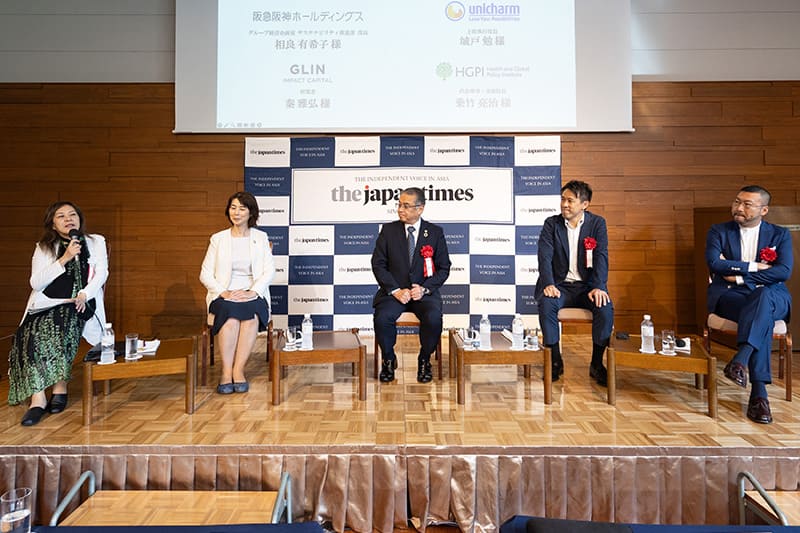
Reviving traditions, building community: Satoyama Award winners lead the way
The second panel session brought together representatives from four awardees in the satoyama category. Moderator Kosuke Motani, a Japan Research Institute senior researcher and Japan Times Satoyama Consortium adviser, noted that “small, community-driven initiatives are beginning to ripple across society through cycles of regeneration and expanding networks,” describing the trend as resonating with ESG principles.
Lifestyle Accent Inc. (Factelier), the Grand Prize winner, has drawn attention for reviving a “cycle of goodwill” in Japan’s apparel industry. CEO Toshio Yamada has built a model that highlights the names of the factories rather than the brand itself and introduced a “factory’s desired price” system, allowing producers to set their own prices, creating a structure through which appreciation from consumers reaches the craftspeople directly. “The apparel industry has long hidden where products are made, leaving the people who actually create them unrecognized,” Yamada said. “That’s why I wanted to restore a cycle where gratitude circulates.” He added that even garments made in the same factory can sell for triple the price depending on the brand, noting that “consumers are beginning to recognize what fair pricing really means. Now is the time to pursue transparency.”
Nakagawa Co. Ltd., based in Wakayama Prefecture and winner of the Excellence Award, promotes what it calls “forestry without cutting trees.” Through planting oak trees, the company works to regenerate local forests. CEO Takashi Tanaka explained that their goal is “forestry that plants and nurtures rather than fells,” focusing on reforesting with oak trees that will one day serve as raw material for Kishu Binchotan charcoal.
The initiative began with zero-cost acorns collected by children, sparking environmental awareness at schools and extending interest in mountain conservation to families and the wider community. Nakagawa also collaborates with local small businesses and welfare facilities to build a community-based system for raising seedlings, planting trees and maintaining the forest. On the ground, the company uses drones to transport materials and reduce physical workloads, and is expanding employment opportunities for women. With a flexible work system and full salary transparency, Nakagawa practices open and inclusive management. “Our mission is to return profits to the community and keep the local economy moving,” Tanaka said.
Also receiving an Excellence Award, Yamaroku Shoyu Co. Ltd. continues to produce soy sauce exclusively in wooden barrels on the island of Shodoshima in Kagawa Prefecture. Representative Yasuo Yamamoto upholds the philosophy of “passing down authentic barrel-aged soy sauce to the next generation,” striving to preserve Japan’s vanishing tradition of wooden barrel brewing. Today, only about 1% of soy sauce in Japan is made in wooden barrels, yet Yamamoto insists it cannot be made without them. Facing the decline of skilled coopers, he commissioned a new barrel in 2009 and later learned the craft himself alongside local carpenters. This led to the launch of the “Wooden Barrel Craftsmen Revival Project,” which has since expanded to include more than 50 brewers nationwide. The initiative has fostered a cycle of mutual support among producers, craftsmen and consumers. “Rather than competition, we believe in co-creation,” Yamamoto said. “We aim to grow Japan’s 1% to 2%, and eventually reach 1% of the global market.” By preserving the unique microbial ecosystems and deep flavors that only wooden barrels can produce, Yamaroku’s work exemplifies a satoyama-style innovation that revitalizes tradition.
The Special Award went to Necchu Gakuen, a general incorporated association that revitalizes closed schools and unused facilities across Japan to foster community connection through lifelong learning. Since its launch in 2015 with government revitalization grants, the Necchu School project has expanded to 15 campuses in Japan and one in Seattle, engaging 1,000 students and 350 instructors. At each school, business leaders, experts and local residents come together as teachers and learners, transcending generations and occupations. These exchanges have sparked projects — from launching welfare facilities and reviving land to creating regional brands — bringing tangible change to communities. Founder and Chairperson Kazufu Hotta believes that “the desire to learn itself becomes the driving force of a community.” By building a flexible network linking municipalities, companies and citizens, Necchu Gakuen has turned the energy of learning into a cycle of local revitalization. “When people connect and become passionate, communities change,” Hotta said. Motani described it as “a satoyama of learning” — a human-centered ecosystem that restores what was once lost through people and shared purpose.
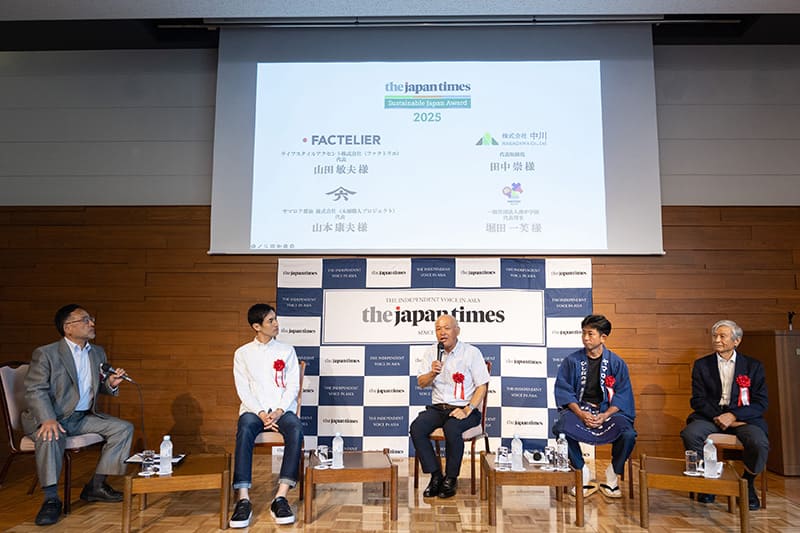
Expanding the circles of co-creation
Concluding the award ceremony, the special session featured four advisers from the Sustainable Japan Network, who shared their insights from the event and perspectives for the future.
Naonori Kimura, a partner at Industrial Growth Platform Inc., identified “co-creation” and “circulation” as the keywords of this year’s awards. Michiyo Morisawa noted that “one person’s passion can inspire others, and shared empathy expands co-creation,” adding that “each initiative embodies a wonderful cycle, and I hope that cycle will continue to spread.” She also emphasized that “these efforts are not just about social contribution — they have become a source of competitive strength for the companies themselves.” Kimura agreed, saying that more companies will succeed in balancing both economic and social values in the future.
Kosuke Motani highlighted the growing power of decentralized, community-based systems in which regions are connected horizontally and support each other rather than relying on central authority. Writer and TV director Kyosuke Inoue challenged conventional economic thinking, saying: “We no longer need to assume that value depreciates over time. Like traditional houses, things that endure gain value as they age.” He described this perspective as a vision of a “nostalgic future,” finding new meaning in traditions that have continued from the past.
Morisawa then said that “in the coming era, it will be essential to cultivate work and sensibilities that cannot be replaced by AI.” Motani responded, “The more AI becomes widespread, the more people will rediscover the unique value of real experiences perceived through the five senses.” Inoue added that “the work of local artisans and creators is a form of art rooted in daily life — and this is where the world’s attention will increasingly turn.”
Kimura emphasized the importance of narrative, noting that “behind everything that moves people, there is always a story. Japanese people are willing to spend money on those stories.” He said the next challenge is how to make such regional and corporate stories visible to a wider audience. Motani added, “A story is not a text — it’s something you feel with all five senses when you stand on site. That authentic sensory experience, which AI cannot replicate, is what truly moves people.”
In closing, Kimura expressed hope that “initiatives like those of today’s award-winning organizations, which bring genuine value to society, will continue to grow. As for The Japan Times, we also hope to help expand the circle of co-creation and circulation.”
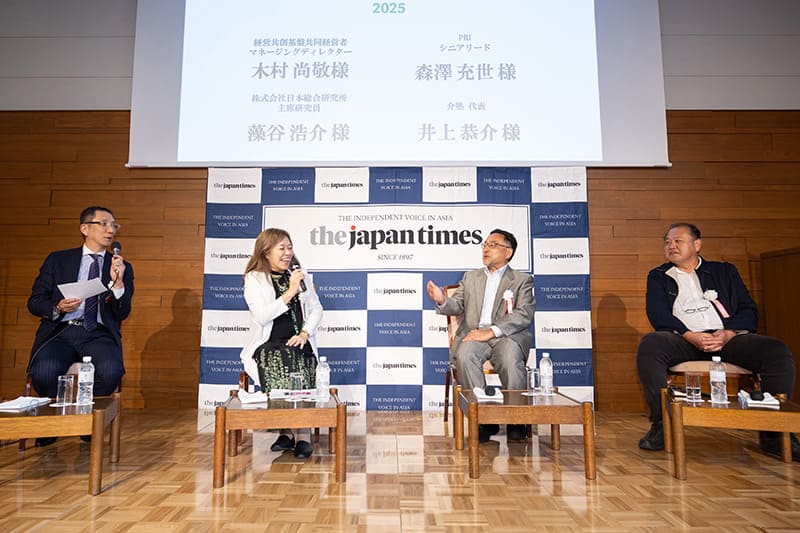
Takao Shiraishi
ENVIRONMENT MINISTRY OFFICIAL
Shiraishi congratulated the award winners and emphasized that the world is now facing a deepening environmental crisis — from climate change and biodiversity loss to global pollution — with Japan also experiencing record-breaking heat and severe rain disasters. He highlighted the Ministry of the Environment’s initiatives to promote ESG finance, shifting capital flows toward sustainability and supporting community-based and corporate efforts. He also noted the importance of addressing local challenges as part of global solutions, reaffirming the ministry’s commitment to advancing environmental policies that foster a sustainable and resilient society for future generations.
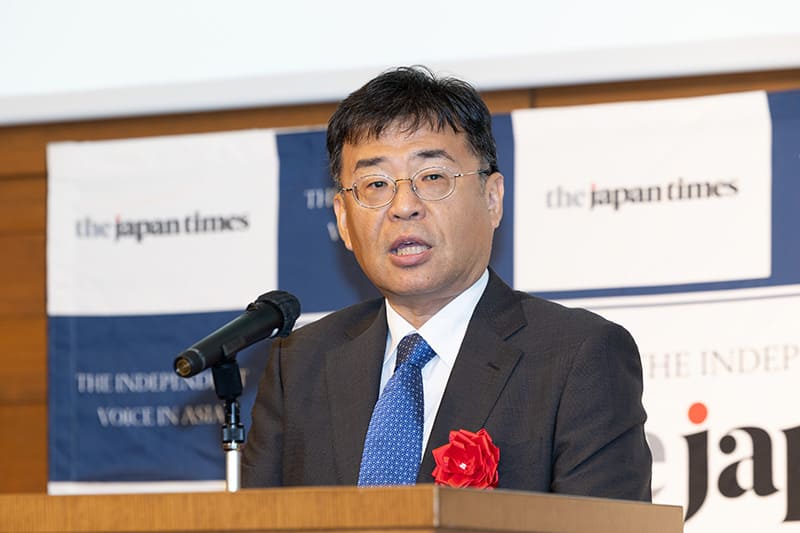
Maiko Todoroki
PRESIDENT AND CEO, POPPINS CORP.
Todoroki offered her congratulations to the winners of the Sustainable Japan Award 2025, praising the companies and organizations for their efforts and achievements for contributing to the harmony of the environment, society and economy, and inspiring hope for future generations.
She said sustainability is not limited to environmental or economic issues but extends to nurturing a society where people can live with security and hope for the future.
Todoroki emphasized that true sustainability cannot be achieved by one person or one company alone, but through learning, collaboration and mutual support across industries and regions.
